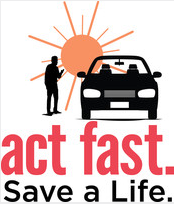On July 31, recognize National Heatstroke Prevention Day by educating your community about the dangers of leaving children in hot cars
Responding to a call for a child who dies of heatstroke in a hot car is one of those events that EMS and other public safety professionals never forget, and those who haven’t experienced it hope they never do. Since 1998, more thank 800 children have died from heatstroke in hot cars in the U.S., including 52 in 2018. On average, one child dies from heatstroke inside a vehicle nearly every 10 days in the U.S.
 Most cases occur when a child is mistakenly left inside or gets into a vehicle unattended – and then becomes trapped. It doesn’t take an especially hot day for a child to die from heatstroke. When the outside temperature is as low as 60 degrees, the temperature inside a vehicle can reach all the way up to 110 degrees. If a child’s body temperature reaches 107 degrees, that child will die from heatstroke.
Most cases occur when a child is mistakenly left inside or gets into a vehicle unattended – and then becomes trapped. It doesn’t take an especially hot day for a child to die from heatstroke. When the outside temperature is as low as 60 degrees, the temperature inside a vehicle can reach all the way up to 110 degrees. If a child’s body temperature reaches 107 degrees, that child will die from heatstroke.
The Office of EMS encourages the EMS community to join NHTSA’s efforts to educate parents, caregivers and the public by sharing campaign materials available on https://www.nhtsa.gov/heatstroke and remembering to #checkforbaby on and off the clock.
To promote further social awareness and amplify the conversation about this vitally important safety issue, NHTSA will host a “Tweet-Up” on National Heatstroke Prevention Day. Every 15 minutes, beginning at 7 a.m. ET on July 31, NHTSA officials will post stats, prevention tips and heatstroke awareness messages using the hashtags #heatstrokekills and #checkforbaby on all the agency’s social media channels. Share these messages with your colleagues and community members to make sure they know the dangers of heatstroke.
This year, NHTSA is also asking everyone to participate in the Heatstroke Awareness Challenge.
Create a 15- to 30-second video about the dangers of heatstroke – then share your video on Twitter, Facebook and Instagram using the hashtags #checkforbaby or #heatstrokekills and tag @NHTSAgov.
More information including downloadable campaign materials and fact sheets are available online. For questions about the campaign, please contact Mike Joyce at Mike.Joyce@dot.gov or 202-366-5600.

